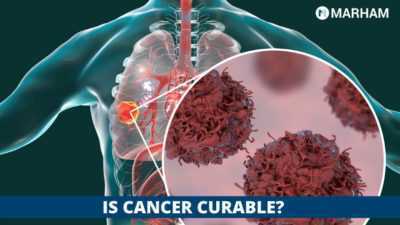When you are having cancer or care about someone who does, the word “cure” may be the most important one to hear and you will think Is Cancer Curable? It’s also a word that most doctors avoid using. Cancer, unlike other diseases, has its own language: there is no cure, but there are treatments that may be able to cure some cancers in some people. It creates all the difference when you understand the distinction.
Discuss your cancer disease with Marham’s most qualified doctors.


Cancer: An Overview
“Fruit” is a broad term that encompasses a wide range of fruits and vegetables, including apple cranberries , pineapple, and others. Similarly, “cancer” is a catch-all term for over 200 different types, including cancers of the bladder, brain, breast), colon, eye. When you have cancer, abnormal cells in your body develop, divide, and destroy healthy tissue. Some grow slowly, while others spread quickly.
Each type begins in a different part of your body and has its own set of grades, stages, and symptoms. Because each type of cancer is unique, there is no one-size-fits-all cure AND THINK Is Cancer Curable? However, people may claim to be cured if their cancer appears to be resolving with treatment. However, it is not quite that simple.
Cure versus Cured versus Remission
For centuries, doctors have used the term “cure” to describe a medical condition that is no longer present and will never return. You’ve been cured if you have appendicitis and doctors remove your appendix. The word “cure” has a different meaning in the language of cancer. Based on calculations from large groups of people, doctors can give you their best guess as to whether or not your cancer will return. No doctor, however, can guarantee that you will be cured. This is due to two factors:
- Doctors do not yet know everything there is to know about the disease.
- Some cancer cells may persist in the body and grow, divide, and form a new tumor. As a result, doctors avoid saying you’re cured.


Most medical professionals refer to “treatments” rather than “cures.” You are considered cured if you receive treatment and your cancer does not recur for the rest of your life. Another important term is “remission“. It means your cancer symptoms have subsided. It is not the same as a cure because remission does not always last the rest of your life.
Treatment
There are no cures for any type of cancer, but there are treatments that may help you live a longer life.
Many people are treated for cancer, live the rest of their lives, and die as a result of other reasons. Many other people are treated for cancer and still die from it, despite the fact that treatment may extend their lives by years or decades. Treatments for common cancers include:
- Surgery
- Chemotherapy
- Radiation
- Immunotherapy
- Bone marrow transplant
- Hormone replacement therapy
- Targeted drug therapy
- Clinical trials
- Hospice care


Treatment plans are customised based on the type of cancer, its stage, your overall health, and your preferences. To know more consult with the best cancer specialists.
Not Perfection, But Progress
Cancer research has been going on in some form or another for over 200 years. Though there is no cure, there has been significant progress. When you have cancer, it may not seem fast enough. However, there are more treatment options now than even 5 years ago. Doctors now have a better understanding of how to detect many cancers in their early stages. They also have a variety of other treatments to try if one doesn’t work. The more researchers learn about it, the more they realize how distinct one type of cancer is from another.
For example, scientists have discovered that not all breast cancers are the same. There are four major types, each with its own set of treatments. Cancer researchers are investigating what causes specific types of cancer to grow in order to develop treatments to stop it. This includes drugs that target the way a cancer cell works and treatments that target cancer cells using your body’s immune system. In medical terms, there has been a significant improvement in outcomes. This means that fewer people are dying from cancer, but there is no cure.


Consult with the Best Cancer Specialists in your City
Book an appointment now, to answer all your queries related to your disease of cancer from an expert. You can book an appointment with the BEST Cancer Specialists in Pakistan through Marham by calling at Marham helpline: 0311-1222398 or by online booking facility through the website or Marham mobile app.
Can’t Find The App?
| Android | IOS |
|---|---|
  |
  |
FAQ’s
What cancers Cannot be cured?
The ten most lethal cancers;
- Pancreatic cancer, mesothelioma, gallbladder cancer, and esophageal cancer
- Cancer of the liver and intrahepatic bile duct.
- Cancer of the lungs and bronchi.
Is cancer curable in early stages?
Although there is currently no cure for cancer, detecting and treating the disease at an early stage can significantly improve a person’s prognosis. Melanoma, Hodgkin lymphoma, and breast, prostate, testicular, cervical, and thyroid cancer have the highest 5-year relative survival rates.
Is cancer a death sentence?
Most people think of cancer as a death sentence when they hear the word, but there have been so many new developments in cancer treatments. Patients are living longer lives with a higher quality of life.

